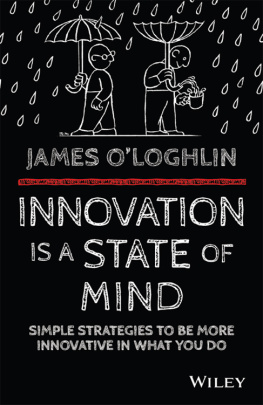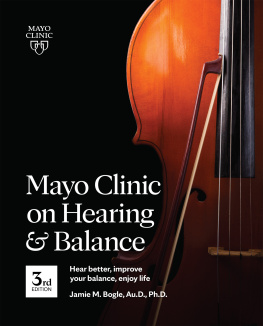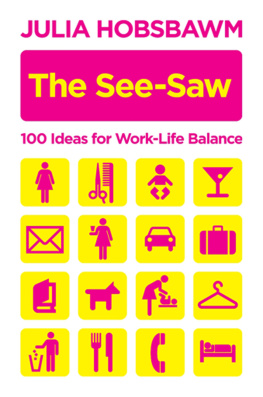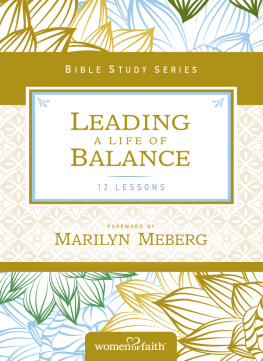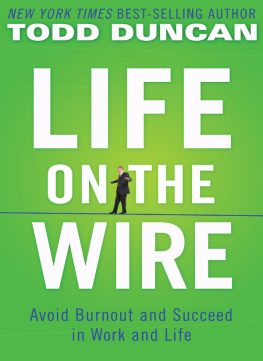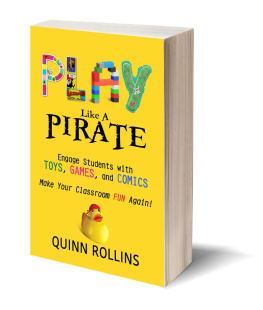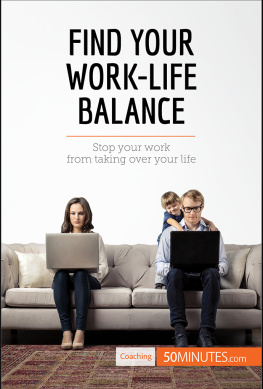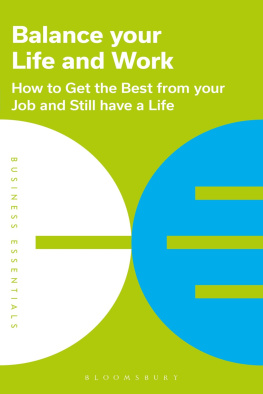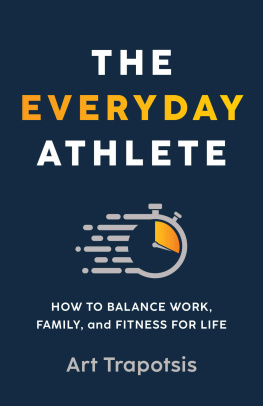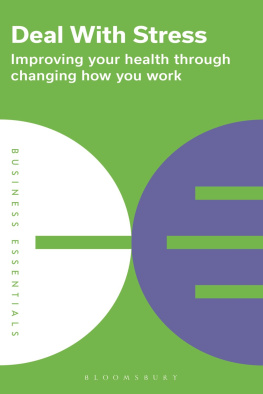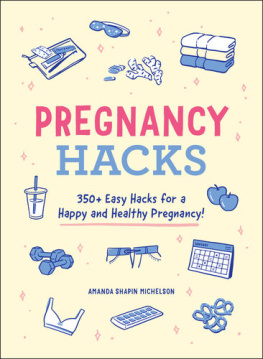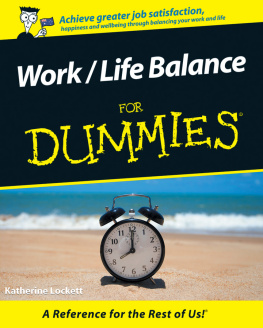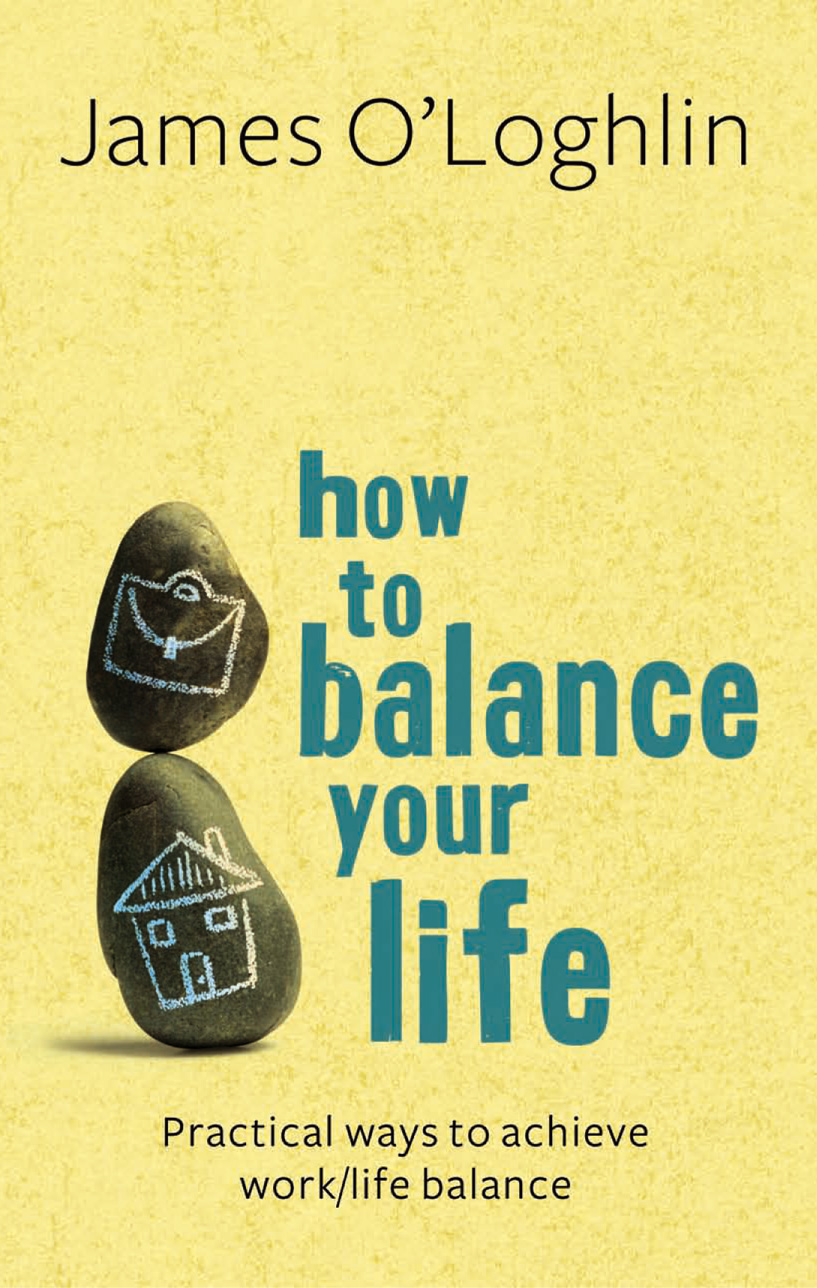James OLoghlin
Practical ways to achieve work/life balance

First published in 2009
Copyright James OLoghlin 2009
All rights reserved. No part of this book may be reproduced or transmitted in any form or by any means, electronic or mechanical, including photocopying, recording or by any information storage and retrieval system, without prior permission in writing from the publisher. The Australian Copyright Act 1968 (the Act) allows a maximum of one chapter or 10 per cent of this book, whichever is the greater, to be photocopied by any educational institution for its educational purposes provided that the educational institution (or body that administers it) has given a remuneration notice to Copyright Agency Limited (CAL) under the Act.
Allen & Unwin
83 Alexander Street
Crows Nest NSW 2065
Australia
Phone: (61 2) 8425 0100
Fax: (61 2) 9906 2218
Email: info@allenandunwin.com
Web: www.allenandunwin.com
Cataloguing-in-Publication details are available
from the National Library of Australia
www.librariesaustralia.nla.gov.au
ISBN 978 1 74175 646 3
Text design by Fisheye Design, Sydney
Set in 11/15.5 pt Adobe Caslon Regular by Post Pre-press Group, Australia
Printed and bound in Australia by Griffin Press
10 9 8 7 6 5 4 3 2 1
contents
The unexamined life is not worth living.
Socrates
introduction
A lot of people are dissatisfied with their work/life balance. They think they spend too much time working, and not enough time enjoying the other things life has to offer. Many want more time with their families. On weekdays they see their kids only during a rushed, busy breakfast time, and then again after work when they snatch some more hurried, tired moments in the window that opens when they get home and closes when the kids go to bed.
And yet while many are dissatisfied, a far smaller number actually do anything to try to change their work/life balance. It is this discrepancy between a seemingly high rate of dissatisfaction and a low rate of action to change things that has motivated the writing of this book. If so many of us feel that our lives are not properly balanced, then why arent more of us using our intelligence and imaginationwhich we employ every day in our jobs to benefit our employers and clientsto improve our own lives?
Some, perhaps, dont know how to go about altering their work/life balance, or feel that there is actually nothing they can do to change it. Others may suspect that there are changes they can make, but are dragged away from focusing on them by the continual need to cope with whatever crisis each day throws up.
Humans are very good at accepting the status quo, particularly if it is not that unpleasant. If you have a job, a home, enough to eat and drink, and a bit of free time in which to go for a walk, watch a DVD or play with your children, it is tempting to think that you are lucky. And you are. Hundreds of millions of people have it a lot worse. But thats no reason not to try to make things even better.
The one thing worse than being dissatisfied with your work/life balance is to not be dissatisfied with it.
Too many people know that their life is unbalanced and that work takes up too much of their time, yet they do nothing to try to change things. They just keep on accepting all of their employers demands in obedient silence. If you are one of the obedient majority who goes to work each day and gets home just in time to read your kids a story before they fall asleep, the first thing to do is to get dissatisfied. You are missing out on a lot. You deserve better. Your family deserves more of you. And you deserve more of them. Our lives are finite, and every day is valuable. Every day that you get home from work after your kids have gone to sleep is a day in which you, and they, have missed out on something important.
Its easy to say to yourself, I have a job, I need a job, and so I have to do everything that my job demands of me. But thats an easy way out. Its ducking the issue. There are things you can do to reduce the number of hours you work and while some of them involve reducing your income, crucially many do not.
There are lots of things most people can do to reduce their work hours that will not result in them earning any less money or doing their jobs any less well.
Its not always simple to grapple with work/life balance issues; it can be awkward to raise them with employers, and tricky to organise your work in a way that gives you more free time. But its often not as hard as you think it will be. And its worth doing, because if you can make changes that lead you to a more balanced lifeone that more closely reflects your ideal mix between work and the rest of your lifethen the reward is huge. The reward is a better life.
And if you dont engage with the issue, what then? If you let things drift because youre too scared to risk rocking the boat, what will happen? In all likelihood, you will end up being one of the masses of people who, towards the end of their life, regret they didnt do things a bit differently. If you duck the issue now, then in 20 years time youll realise that your lifes big mistake was to spend too much time working and that, as a result, you missed out on some of the most important things there are.
The first step is to take on the issue of work/life balance and to work out if yours is as good as it can be. If you find that it is perfect then, great. Congratulations. But you may find that things could benefit from a bit of tinkering.
a definition
What is work/life balance? Its a measure of how much time you work and how much you have left for other things in your life. One way of measuring it is to simply take the total number of hours you are awake each week, and subtract from it the total number of hours you are working, travelling to or from work, or thinking about work. The smaller the number you have left, the more out of balance your life may be. I say may be because there are subjective factors at work too. Some people love their job and would genuinely prefer to be working than doing almost anything else. Others keenly resent the amount of time they feel they have to work.
Assessing your work/life balance involves asking yourself some hard questions. It means working out whether you feel that you are working too much, and if you are, figuring out how you can work less. The aim is to achieve a balanced life, which I define as a life where you have sufficient time to properly engage with, and discover, other things that are important to you outside work. That may be family, it may be golf, it may be gardening, it may be going to the races, or it may be all those things and more.
Of course we all need to earn an income, and that is where the balance comes in. How do we balance the need we have to earn the money required to feed, clothe and buy books for ourselves and our dependants against the desire we have to enjoy lifes other pleasures? By the end of this book, you should be closer to an answer.
part 1
why you
should
balance your
life
chapter 1
why
people
dont
lead
balanced
lives
BEFORE we discuss strategies you can use to rebalance your life, its worth trying to work out why people are so quick to notice that their work/life balance is not as they would like it to be, but so slow in acting to try to change it. What holds us back? Lack of motivation? Fear? Insecurity? A sense that there is nothing that can be done?


